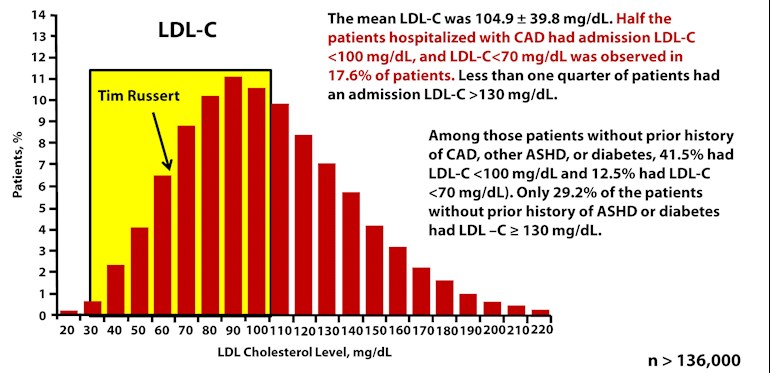For the past 50 or so years, the medical community has psychologically conditioned their patients (and media) to focus their cardiovascular disease (CVD) risk-reduction strategies on lowering total cholesterol and more specifically LDL-C (lipoprotein cholesterol volume).
Research done over the last 10 (or more) years has demonstrated that measuring LDL-P (lipoprotein particle number) is a superior risk stratifying metric when it comes to predicting CVD events.
As Dr. Peter Attia points out:
"The real world tragedy: 90-95% of physicians, including cardiologists, would bet their own lives that persons with an LDL-C < 70 mg/dL [1.8 mmol/l] have no atherosclerotic risk.
Tim Russert (click on link below), shortly before his death, had his LDL-C level checked. It was less than 70 mg/dL. Sadly, his doctors didn’t realize they should also have been checking his LDL-P or apoB. The figure below [see image at the top of this post], which is from one of Tom Dayspring’s presentations, shows data from this study of nearly 137,000 patients hospitalized for coronary artery disease between 2000 and 2006. As you can see, LDL-C fails to even reasonably predict cardiovascular disease in a patient population sick enough to show up in the hospital with chest pain or outright myocardial infarction."
The greatest tragedy is that doctors are prescribing potentially dangerous statin drugs to people with elevated levels of LDL-C without knowing their LDL-P which is the REAL risk indicator. Statins can lower LDL-P too, but so can a good diet and daily exercise as I have proven in my own situation as have many others in the world.
The best way to measure LDL-P is using the NMR Lipoprofile blood test. The NHA in the U.K. being a government-funded entity with limited financial resources will not pay for the NMR Lipoprofile (penny-wise, pound foolish).
People should stop being alarmed by total cholesterol and LDL-C values without first testing for LDL-P (or its proxy Apo-B). That said, total cholesterol and LDL-C can still alert you to the fact that you may have an inflammatory diet and lifestyle. So at all times, it should be everyone's objectives to improve their diet and lifestyle.
Furthermore, the NMR Lipoprofile also reports your Insulin Resistance Marker. This too is of great value in your risk assessment.
---------------------------------------
Who was Tim Russert:
latimes.com/health/la-he-cl...
You can read the full explanation by Dr. Peter Attia here:
peterattiamd.com/the-straig...
LDL-P as treatment guide:
cardiovascularbusiness.com/...
Medical study backing up this data can be read here:

 However there is no going back - the calcification cannot be reduced - but the most worrying part of it is that the calcified plaque only represents around 20% of other soft plaques that are there. And it is the unstable soft plaques that cause the problems . Anyway , I also had an ultrasound ECG test and , as I am fairly fit, was able to run on a treadmill to 100% of my maximum heart rate ( at least what the medicos "think" is my maximum HR but which I know is actually bigger than what they calculate ) and no blockages showed in my arteries. However my understanding is also that an artery has to be blocked to around 80% blockage to show up on these ECG machines so I could indeed have a smaller blockage somewhere) . But anyways, I run a lot and have frequently raised heart rates for longish periods of time and have not had any problems so far . I have what they call "asymptomatic" CVD - that is I have cardiovascular disease which shows no symptoms - often called the "Widowmaker" whose first symptom is death! Unfortunately, I now do have a "kind of /possibly" symptom of CVD/artherosclerosis - what is called Central Retinal Vein Occlusion which has caused "half" blindness in one eye.
However there is no going back - the calcification cannot be reduced - but the most worrying part of it is that the calcified plaque only represents around 20% of other soft plaques that are there. And it is the unstable soft plaques that cause the problems . Anyway , I also had an ultrasound ECG test and , as I am fairly fit, was able to run on a treadmill to 100% of my maximum heart rate ( at least what the medicos "think" is my maximum HR but which I know is actually bigger than what they calculate ) and no blockages showed in my arteries. However my understanding is also that an artery has to be blocked to around 80% blockage to show up on these ECG machines so I could indeed have a smaller blockage somewhere) . But anyways, I run a lot and have frequently raised heart rates for longish periods of time and have not had any problems so far . I have what they call "asymptomatic" CVD - that is I have cardiovascular disease which shows no symptoms - often called the "Widowmaker" whose first symptom is death! Unfortunately, I now do have a "kind of /possibly" symptom of CVD/artherosclerosis - what is called Central Retinal Vein Occlusion which has caused "half" blindness in one eye.